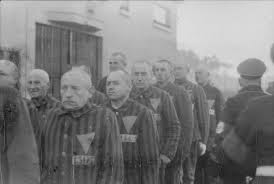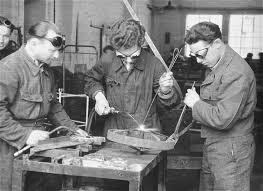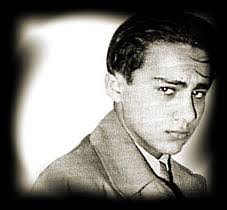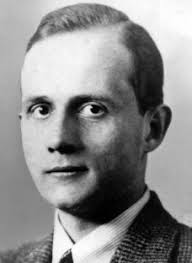The Story of John Heller
The story of John Heller, a former Fair Lawn resident. It was delivered in November of 2011. It is part of the oral history project being compiled by the JHSNJ.
I was born on October 19, 1922 in Berlin where my father was born also. For the first ten years of my life everything seemed normal. My father – with my mother’s help – had a good going business. He was a licensed plumber and licensed electrician. We always had a maid because my mother helped out, not only with typing out bills, but also running the housewares store which was connected with our ground floor living quarters in a Berlin apartment building. At the end of the 1920s my parents bought a property 19 miles from our city home and had a smallish weekend house built on it. …We spent most weekends and school vacations there – a nearby lake gave us swimming opportunities. We didn’t have to take the train to get to our country place – my father’s car gave us house to house service.
All was well until the Hitler regime came to power in 1933….Year by year new restrictions were announced. Park benches for Jews were painted yellow. Automobiles owned by Jews were required to have “355” added to their license plates, causing all kinds of unpleasantness for the owners. Many Jews lost their jobs. Domestic help had to be over age 45 to work in a Jewish household. Every Jewish male or female received the middle name of wither Israel or Sarah. After graduating from elementary school, I was not permitted to become an apprentice at any trade or place of work. I was lucky enough to be able to enter an ORT* school in the spring of 1938. …I made good progress for a few months in the beginners’ courses. Then came the murder of a German Consular employee by a Polish gunman** who was enraged by the German action of rounding up all Polish Jews and “dumping” them on Polish territory just over the German border. The Nazi government took the murder by a Jew as a reason to make our lives more miserable. They ordered what became known as Kristallnacht. After Kristallnacht, it became clear that Jews could no longer live in Germany.
My mother, during my father’s absence [taken to Sachsenhausen Concentration Camp], had applied for a visa to go to the United States. I returned to the ORT school (1939) that was considering a move to England. After a few months of preparation, all of about 110 of us got their passports with British visas. On August 27, 1939, we walked out of the school with only enough baggage to last a week….Some of the parents had gone there to wave good bye to us, never imagining that they would never see their sons again.
We reached England late on the 29th and took a train to London and then were taken to a World War I army camp, Kitchener Camp, which was now a refugee camp for 3000 males. We stayed at Kitchener Camp only about 3 months during which time British ORT had secured 3 fairly large buildings as hostels for us students and an industrial building with equipment so we could continue our training. This was quite an achievement in wartime.
Even though we were all interviewed at the Camp where we got identity papers which read “refugee from Nazi oppression,” some of our boys, when they reached the age of 18 were taken to internment camps on the Isle of Man, to Canada, and Australia. When I felt I knew enough to be able to stand on my own two feet, I applied for a job at a machine shop…By my own choice, I had two more jobs in England before emigrating to America. In the spring of 1941 my parents reached New York where my father, unfortunately, died in 1943
I arrived in New York in February 1947 [and] had no problems finding a job right away. In the close to forty years of my working life, I was out of work only about 4 days, always of my own volition. Nowhere in any workplace was there anyone who could perform as many different tasks as I was able to, thanks to my ORT training. My “official” work description was “Tool and Die Makers and Mold Maker for Plastics and Industrial Ceramics.”
In 1951 I married my wife Margot who had also been born in Germany…She had been deported to France [and] survived with false papers provided by the underground. Until we had our first child, she worked in a factory making soft material handbags and shopping bags. Our first child died of Tay-Sachs Disease just before the birth of our second son, Mark. Our third son passed away also. Naturally, we were heartbroken. Only the knowledge of having one bright child kept us going. As I am writing this it is hard for me to believe that my dear Margot has not been with me for almost 1½ years. My depression since then is hard to describe. I keep myself busy with talking to ORT chapter meetings. …I also lecture or have interviews with youngsters at Hebrew schools and synagogues. They want to hear from a Holocaust survivor what had happened and resolve that it would never happen again. I was so lucky not to have seen the inside of an extermination camp thanks only to ORT who saved and enhanced my life.
John Heller

Sachesenhausen concentration camp

*O.R.T. school – According to Wikipedia, “O.R.T. is a global education network driven by Jewish values. It promotes education and training in communities worldwide. Its activities throughout its history have spanned more than 100 countries and five continents. It was founded in 1880 in St.Petersburg to provide professional and vocational training for young Jews.”

"Herschel Grynszpan was a 17 year illegal immigrant living with his uncle in Paris. He was enraged when his parents, along with 12,000 other Polish Jews living Germany, were robbed of their property by the German Government and unceremoniously dumped across the Polish border. Herschel bought a gun and entered the German Embassy in Paris where he assassinated Ernst Vom Rath, a consular official there. It is believed that Herschel first intended to kill the German ambassador but mistakenly walked by him without recognizing him.

Ernst Vom Rath
